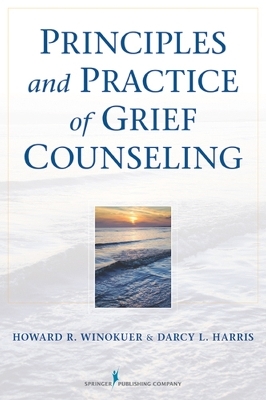
Principles and Practice of Grief Counseling
Springer Publishing Co Inc (Verlag)
978-0-8261-0872-2 (ISBN)
- Titel ist leider vergriffen;
keine Neuauflage - Artikel merken
This core, introductory textbook for undergraduate and graduate level courses is the first volume to combine the knowledge and skills of counseling psychology with current theory and research in grief and bereavement. It is grounded in the belief that grief counseling is distinct from other therapeutic issues because grief is an adaptive response rather than a form of pathology. The book describes the unique aspects of grief as a normal response to loss, and views the goal of counseling bereaved individuals as one of facilitating the unfolding of the healthy and adaptive aspects of the process as it manifests itself within each client. Grief is considered a response to losses that are both death- and non-death-related; and psychological, physical, social, economical and practical experiences of grief are addressed.
The text introduces various theories of bereavement and examines different therapeutic modalities that can be used in the context of grief and loss. Specific counseling practices that facilitate successful interventions are discussed, particularly that of presence, considered by the authors to be the primary therapeutic stance when working with bereaved individuals. The text also addresses grief counseling with special populations, ethical issues, and self-care concerns for counselors. Case studies, discussion and reflection questions, and suggested additional resources are included in each chapter.
Key Features:
Regards grief therapy as a unique form of counseling based on grief as an adaptive response rather than as a form of pathology
Combines the knowledge and skills of counseling psychology with current research in grief and bereavement
Written by a prominent clinician and an educator with over 60 years of combined experience in grief counseling
Focuses on the importance of presence as the most important therapeutic foundation for working with bereaved individuals
Howard R. Winokuer, PhD, is the founder of the Winokuer Center for Counseling and Healing in Charlotte, NC where he maintains a full-time clinical practice. He completed his PhD in 1999 at Mississippi State University where he developed the first course in Grief Counseling Skills. As the founder of TO LIFE, a not-for-profit educational and counseling organization, he was the associate producer of seven PBS specials and helped pilot one of the first teen suicide prevention programs in the Southeast. He has taught numerous courses on grief counseling and been a guest lecturer at many colleges and universities. Dr. Winokuer has conducted workshops and seminars throughout the United States as well as in nine foreign countries. He wrote a bi-monthly column in The Concord Tribune entitled ""Understanding Grief"" and hosted a regular radio show on WEGO entitled ""Life Talk."" He was a consultant to WBTV, the local CBS affiliate in Charlotte, NC, after the tragedy of 9-11 and has been the mental health ""professional on call"" for Fox TV's news show ""The Edge."" He has recently appeared on the radio show ""Healing the Grieving Heart"" and has been interviewed by the ACA Journal, Counseling Today, and numerous major newspapers in the US. Dr. Winokuer led an international delegation of funeral directors to Russia and Holland to study death and funeral practices in those countries. He has been an active member of The Association for Death Education and Counseling (ADEC) for almost three decades and has served in numerous leadership positions within it. He was one of the co-editors for the recently released book Grief and Bereavement in Contemporary Society: Bridging Research and Practice. ||Darcy L. Harris, PhD, FT, is a professor in the Department of Interdisciplinary Programs at King's University College at the University of Western Ontario, London, Ontario, where she is the Coordinator of the Thanatology Program. She also maintains a private clinical practice with a focus on issues related to change, loss, and transition. She serves as a consultant for the Southern Ontario Fertility Treatment Program, and is a community consultant for victims of traumatic loss. Dr. Harris also serves on the ethics committee and the quality care committee at St. Joseph's Health Centre in London, Ontario. She planned and developed the undergraduate degree program in Thanatology at King's University College and implemented coursework in Thanatology in the specific interest areas of critical theory, social justice, and the exploration of grief after non-death losses. She is also adjunct faculty in the College of Graduate Studies at the University of Western Ontario, and she is on the Board of Directors for the Association for Death Education and Counseling. Dr. Harris has written extensively, and frequently provides presentations on topics related to death, grief, and loss in contemporary society. She is author of Counting Our Losses: Reflecting on Change, Loss, and Transition in Everyday Life and co-editor of Grief and Bereavement in Contemporary Society: Bridging Research and Practice.
Part 1: Theoretical Underpinnings 1) Basics about counselling 2) Unique aspects grief counselling 3) Theories and orientation to bereavement and counselling
Part 2: Practice and Process 4) The Foundation: Learning the practice of presence 5) The Basics of Counselling Practice 6) Working with bereaved individuals 7) Living Losses: Non-death, Non-finite, and Ambiguous Loss 8) Working With Clients' Strong Emotions and Yours 9) When Grief Goes Awry--How to name it; What to do 10) Therapeutic Modalities and Approaches in the Context of Grief 11) Ethical Issues in Grief Counselling
Part 3: Current Issues and Trends 12) Caregiver Issues for Counsellors 13) Current Trends and Issues in Grief Counselling
Afterword
| Zusatzinfo | 24 Illustrations |
|---|---|
| Verlagsort | New York |
| Sprache | englisch |
| Gewicht | 341 g |
| Themenwelt | Sachbuch/Ratgeber ► Gesundheit / Leben / Psychologie ► Psychologie |
| Geisteswissenschaften ► Psychologie ► Trennung / Trauer | |
| Medizin / Pharmazie ► Medizinische Fachgebiete ► Psychiatrie / Psychotherapie | |
| Sozialwissenschaften ► Soziologie | |
| ISBN-10 | 0-8261-0872-5 / 0826108725 |
| ISBN-13 | 978-0-8261-0872-2 / 9780826108722 |
| Zustand | Neuware |
| Haben Sie eine Frage zum Produkt? |
aus dem Bereich


